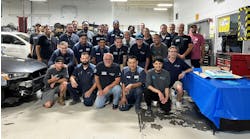High-Temperature-Resistant Plastics Use In Motors and Gears Rising
LONDON, UK (Sept. 1, 2005) - In spite of metal alloys being the materials of choice for many motor and gear applications, high-temperature plastics are establishing themselves in these areas within the automotive sector, particularly in engines, clutches, transmissions and drivetrains.
High-temperature-resistant plastics are being increasingly used in the production of modern vehicle components, such as gears, hot fuel systems, fuel reservoirs, ignition modules, oil screens, bearings, pistons, pumps, valves and air manifolds. These new plastics can be found in applications where high temperatures would have degraded earlier generation polymers. Michael Valenti, a analyst with Frost and Sullivan, conducted an in-depth research study titled "Advances in High Temperature Resistant Plastics for Use in Motors and Gears," and in the report cites a number of drivers stimulating the use of high temperature plastics within the auto industry.
He notes that lingering doubts among potential end-users about the effectiveness of these plastics are holding back their widespread adoption. Moreover, plastics processing, when compared to metalworking, is extra-sensitive to environmental factors, such as humidity. For example, one of the toughest uses for plastics in automotive motors is in bearings, which have to withstand high temperatures, as well as pressures, wear and chemical aggression to be proven effective.
So why bother? Despite concerns, the analyst points out several distinct advantages plastics hold over metal:
Lighter weight: "Injection molding of high-temperature-resistant plastics provides makers with design flexibility, high production rates, lower labor costs and lesser need for finishing molded parts," Valenti said. "Compared to the costly and labor-intensive forging, casting, cutting, and grinding of metals, these factors attract manufactures to shift to polymers." The greatest advantage the parts offer to automakers is their lighter weight. This translates into greater fuel efficiency, a benefit brought home by the ongoing spike in gasoline prices.
(Photo: Karcoma-Armaturen GmbH)
Market opportunity: Replacing metal parts is a huge opportunity for high-temperature-resistant plastics manufacturers such as Dow Chemicals Co., DuPont Inc. or Performance Plastics Ltd. Opening new markets for next-generation polymers is probably the fastest way to increase their demand, Valenti suggested. Leading plastics makers that are already involved in high-temperature product development are expected to continue manufacturing them, particularly in automotive applications where there is enough capital to buy costly products. Performance Plastics Ltd., for instance, was cited as a company that saw the opportunity to specialize in injection molding high-performance plastic polymers. The company has compounded PEEK (polyetherether ketone) and PTFE (teflon) to make bearings for industrial and automotive purposes.
Lower unit cost: The production costs using high-temperature plastics are typically cheaper per unit compared to metals. Performance Plastics Ltd. says that the typical savings using plastic polymers rather than metal is approximately 20 percent.
Flexibility: As alternatives to the internal combustion engine such as hybrids get closer to mainstream commercialization, lightweight materials will continue to be preferred over metals. Besides their diversity in temperature ranges, chemical resistance and physical durability, injection molding and computer-aided design enable plastics to be custom-made to suit specific applications. They also allow faster machining of finished parts and produce less waste - saving both time and money.
(Photo: Igus Inc.)
Corrosion resistance and noise reduction: Plastic gears, bearings and other components are corrosion-resistant and reduce noise significantly. This, as well as their low maintenance costs and longer life spans, can open up tremendous opportunities in the high-temperature plastics market for motors and gears.
Improved quality and longer life: High-performance plastics have been successful in improving the quality and working life of parts in numerous industrial applications that were once served by metal components. New plastic gears have lower power consumption while ensuring longer wear. These applications comprise of feed, spur and worm gears. Plastic gears were, until recently, restricted to low-transmission applications, but improvements have brought them into high-performance functions including racecars. Because plastic gear manufacturing is cheaper than that of metal gears, even incremental improvements in the performance of the former are expected to expand their use.
Even though such high-performance plastics can meet the challenging requirements in engines, entry into the industry and tooling up for manufacturing can come at a high price. Valenti says that the need for reducing the inherent costs of these resources is apparent, and will happen over time with the refinement of processing, reduction of material costs relative to metals and increases in demand.
(Photo: Robert Bosch GmbH)
Leading plastics makers and component manufacturers that are already involved in the development of high-temperature products will continue manufacturing them, particularly for end-user markets that are capable of investing in expensive products such as automotive engines. Companies that extensively employ chemical engineering capabilities in their research and development divisions will benefit from this opportunity. These include U.S.-based companies such as DuPont Inc. or Dow Chemicals Co. that manufacture materials used by automakers or their suppliers. Several examples of automotive applications follow.
Karcoma-Armaturen GmbH of Germany manufactures glass-reinforced Victrex PEEK polymer oil screens which are supplied for truck manufacturing, including those from top-of-the-line companies. In this application, the polymer is molded in a single step onto a metal fabric that can endure high oil temperatures, providing Karcoma-Armaturen significant cost and weight savings.
Similarly, one of the toughest applications for plastics in automotive motors is bearings. Igus Inc., another Germany-based multinational developer of plastic bearings manufactures the IGLIDE series of bearings that can withstand high temperatures and corrosive chemicals in automotive applications. The bearing are made of base plastics from 20 different blends of materials that are designed to handle the application's load and are manufactured with fibers and filling materials that reinforce the bearings under high forces or edge loads. The bearings contain solid lubricants to self-lubricate, prevent friction and lengthen life of the bearing.
(Photo: Ticona Engineering)
Robert Bosch GmbH manufactures a glass fiber-reinforced composite throttle body for gasoline engines. The company says the thermoplastic composite is 25 percent lighter than the firm's previous aluminum throttle device. It can withstand higher temperatures, is more economical to build and is more easily adaptable to different OEM engines.
Celanese Corp. through its subsidiary Ticona Engineering manufactures a polymer, Fortron linear polyphenylene sulphide, that is used in electromechanical rear parking brake actuators and gears for a number of automakers including Audi and Volkswagen. The polymer has demonstrated superior qualities to metal alloys across a wide temperature range from below freezing to 180?C; it also is used because it withstands the impact of stones thrown up by tires from the road surface. In addition, it has superior resistance to brake fluid and other automotive chemicals.
Going forwards, Valenti says market participants need to mobilize awareness among potential end-users about the high heat resistance of these plastics and their chemical and hydrolytic strengths. This will help dispel doubts regarding their performance, as well as harness the rising overall demand. But for the foreseeable future, similar to computerization, the use of high-temperature plastics will continue to be a growing trend in automobiles.
(Sources: Frost and
Sullivan, Robert Bosch
GmbH, Igus Inc., Karcoma-Armaturen
GmbH, Ticona
Engineering)


